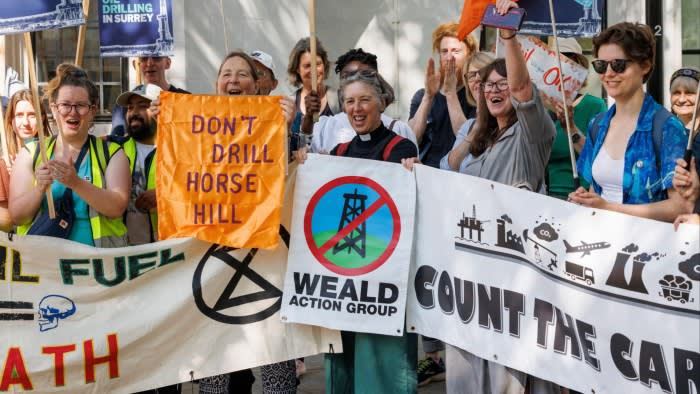Stay informed with free updates
Simply sign up to the Climate change myFT Digest — delivered directly to your inbox.
The broad climate impact of burning fossil fuels should be considered when granting permission for drilling sites, the UK’s Supreme Court has ruled in a verdict that could make it harder for new projects to go ahead.
In a landmark judgment on Thursday, the country’s highest court said a local council in England should have considered the emissions from burning the oil and not just the narrower effects of extracting it.
By a three-to-two majority, the court found that Surrey County Council’s decision to expand a permit was unlawful. The expanded permit for the project in Horse Hill, near Horley, in 2019 “must be quashed”, Lord Justice George Leggatt said.
Campaigners welcomed the precedent set by the ruling. Local authorities may be required to consider not only the release of greenhouse gases but also the emissions from the oil being refined and burnt as fuel.
Friends of the Earth said the ruling would have “enormous impacts” on whether similar developments can proceed, including the Whitehaven coal mine project in Cumbria and the Rosebank oilfield project in the North Sea.
The environmental impact assessments for both these projects focused on their direct emissions.
The group estimates that downstream emissions from the expansion of two oil wells and drilling for four new ones by Horse Hill Developments Ltd would lead to 10mn tonnes of CO₂ and equivalent gases being emitted.
The challenge was led by Sarah Finch, a former resident, on behalf of the Weald Action Group and backed by campaign group Friends of the Earth. Her case was previously rejected by the High Court and then again by a majority of Court of Appeal judges.
“The oil and gas companies may act like business-as-usual is still an option, but it will be very hard for planning authorities to permit new fossil fuel developments — in the Weald, the North Sea or anywhere else — when their true climate impact is clear for all to see,” Finch said.
Conservatives promised last year to “max out” oil and gas reserves in the North Sea, while Labour’s position is to end new North Sea licences.
Mel Evans, a campaigner at Greenpeace UK, said the ruling was a “huge win for the climate” and would force the government to confront what is said was the incompatibility of new oil and gas developments with the UK’s climate commitments.
The government has a legally binding goal to cut carbon dioxide emissions across the economy to net zero by 2050.
The International Energy Agency has said that no new oil and gas projects are needed if global warming is to be kept in check to 1.5C above preindustrial levels, a goal laid out in the 2015 Paris agreement.
Surrey County Council said that its officers believed they had acted in compliance with the law at the time. “The judgment makes it clear that local planning authorities must have regard to downstream emissions,” it said.


